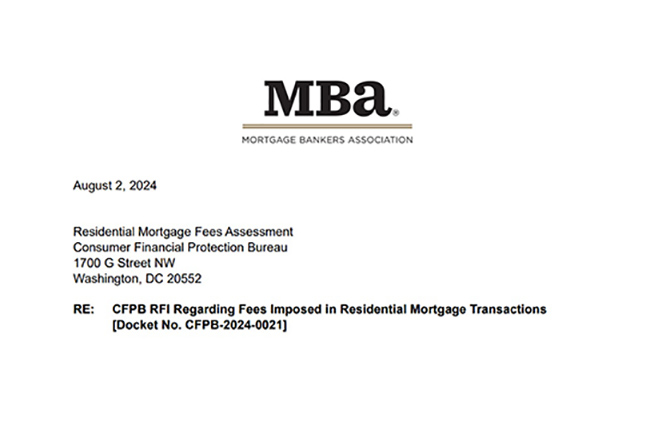
MBA Responds to CFPB Request for Information on Mortgage Closing Costs

MBA submitted a comment letter to the CFPB on Friday in response to the bureau’s request for information on mortgage closing costs.
Click here to read the comment letter.
Key takeaways include:
Any regulatory action resulting from this RFI must be grounded in the Bureau’s statutory authority.
The body of law and regulation shows a strong preference for early disclosures and consumer shopping over rate setting or lender-based settlement service negotiations. The Bureau must be faithful to the limits on its statutory authority, previous regulatory reviews and assessments as well as consider the significant implementation costs and time spent by industry in any future actions it pursues to change how closing costs are handled in the mortgage origination process.
The fundamental drivers of the current barriers to homeownership and affordability are low housing inventory and pandemic-induced macroeconomic conditions. Rising closing costs are a consequence of these issues, and in any event are not a primary driver of affordability challenges.
MBA is concerned that the Bureau’s focus on mortgage closing costs is misguided and that they are inaccurately characterizing certain disclosed, required and necessary mortgage-related fees as “junk fees” in its press releases, blogs, circulars, advisory opinions, and public speeches.
We fear previous statements suggest that the CFPB may have already arrived at predetermined conclusions about the questions in this RFI and the validity of these charges.
Contrary to the CFPB’s narrative, mortgage lenders have suffered eight straight quarters of net production losses. With this significant decrease in profitability, it becomes apparent that lenders are in fact not benefiting from the increase closing costs.
The impact of the recent increase in credit reporting fees is magnified because of low pull-through rates, resulting in lenders bearing more costs when a borrower does not proceed to close a transaction. MBA has and will continue to advocate for more transparency in how credit reports are priced.
As the CFPB knows, several of the costs lenders disclose and pass on to consumers are not within their discretion to set. Investors and guarantors require certain settlement services to be performed before they purchase, securitize, and/or insure a loan, as they are important risk mitigants.
There are other regulatory and policy changes that could lower closing costs, the letter said. These include:
Loan Officer Compensation Reforms – CFPB should consider amending the LO Comp Rule to permit loan originators to agree to reduce their compensation to facilitate the lender’s ability to respond to price competition
TRID Changes – simplifying the itemization of certain settlement service costs to both reduce the cost of compliance and provide a clearer disclosure to consumers. For example, numerous fees related to title insurance can be simplified by grouping the fee types.
Appraisal costs – Greater adoption by the GSEs of property inspection waivers (PIWs) and hybrid appraisals could also translate to significant cost savings for homebuyers.
